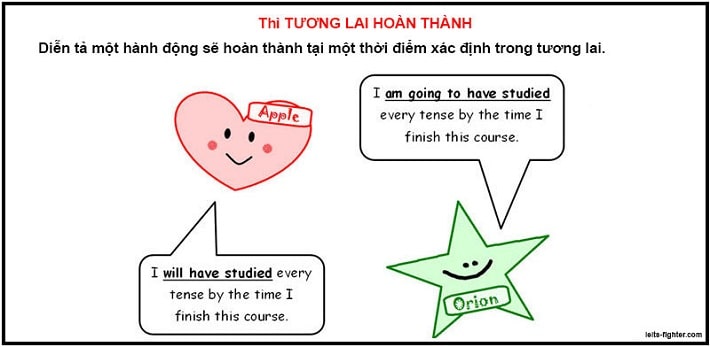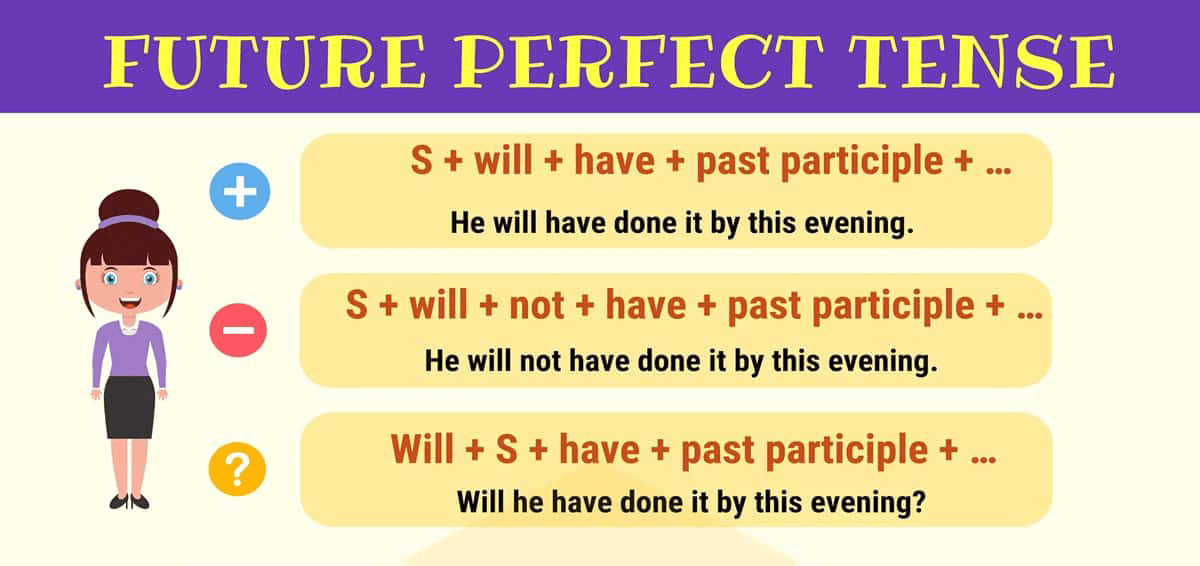Future perfect tense
With EnglishTopVN, learn important knowledge about FUTURE PERFECT tense with formulas, signs, exercises with detailed answers. Besides, you should practice future perfect tense to consolidate knowledge applicable to all exams.
1. Concepts
Future perfect tense (Future Perfect) is used to Describes an action or event that will be completed before a certain time in the future. Or use it to Describes an action or event that will be completed before another action or event in the future.

Example of future perfect tense
2. Formula

In there:
- S (subject): Subject
- Will & have: Auxiliary verb
- VpII: Participle II of the verb (past participle)
2.1. Affirmations
S + will + have + VpII
✎ NOTE:"have" always comes after "will"
For example:
- I will have finished my homework this weekend.
- He will have completed he reported by the end of this month.
2.2. Negative sentence
S + will + not + have + VpII
✎ NOTE:For negative sentences, we only need to add "not" right after the auxiliary verb "will" and we can write "will not" as "won't".
For example:
- I won't have finished my work this week.
- She will not have discharged from the hospital until the end of next month.
2.3. Question
Will + S + have + VpII ?
Reply:
- Yes, S + will
- No, S + won't
✎ NOTE:
- Interrogative sentences invert the auxiliary verb "will" to the beginning
- Questions using "what, how, when, why,..." have the form: Wh-word + will + S + have + VpII ? (For example: How will you have finished your essay this weekend? => How will you finish your essay this weekend?)
For example:
- Will you have graduated later this year?
- Will they have finished their homework in the next 2 hours?
3. How to use
➣ Used to describe an action or event completed before a time in the future or used to describe an action or event completed before another action or event in the future (action, event completed). The previous form will be divided into the future perfect tense. Actions and events that happen later will be divided into the simple present tense.
For example:
- I will have finished my homework before 23 o’clock this evening.
-> We see that "9 o'clock tonight" is a time in the future and "homework" will be completed before this time, so we use the future perfect tense.
- When you come back, Iwill have typedthis email.
- I will have made the meal ready before the time you come tomorrow.
4. Identification signs
4.1. These sentences contain the following phrases:
- by+ future time
- by the end of+ future time
- by the time …
- before+ future time
For example:
- By the end of this month I will have taken an English course.
(Used to describe an action or event completed before a time in the future)
- I will have finished my homework before 9 o’clock this evening.(By 9pm tonight I will have finished my homework.)
We see that "9 o'clock tonight" is a time in the future and "homework" will be completed before this time, so we use the future perfect tense.
4.2. Used to express actions
➣ Used to describe an action or event completed before another action or event in the future.
- Actions and events completed first will be divided into future perfect tenses. Actions and events that happen later will be in the simple present tense.
For example:
- I will have made the meal ready before the time you come tomorrow. (Tomorrow I have prepared the meal before you come tomorrow.)
We see two things that will happen in the future: "prepare the meal" and "you come". "Preparing the meal" will be completed before "you arrive" so we use the future perfect tense. Things that happen after "you come" will be in the simple present tense.

